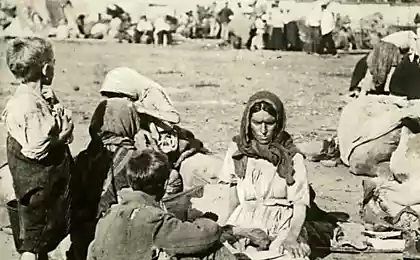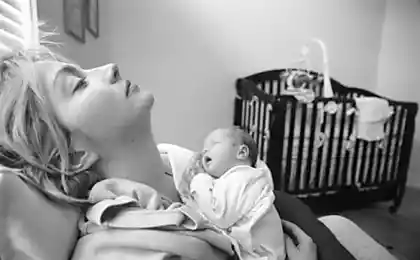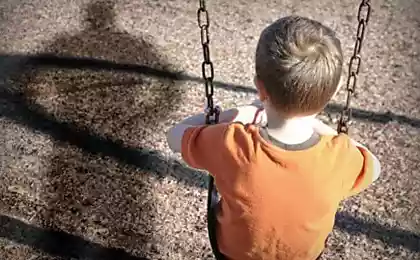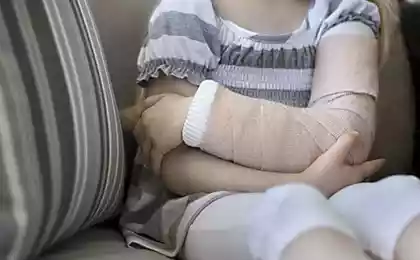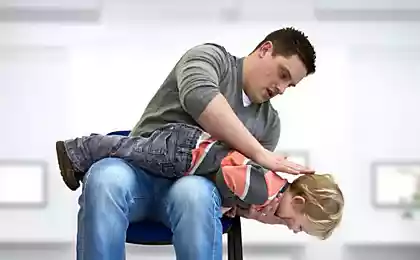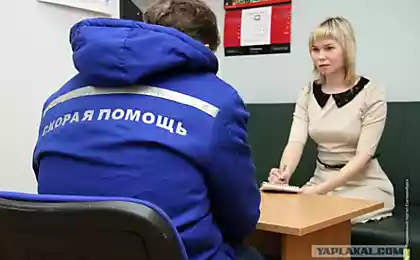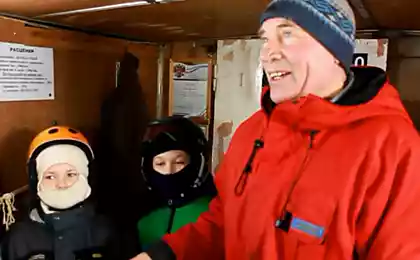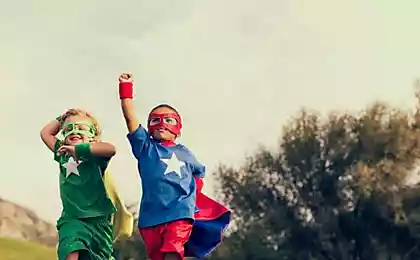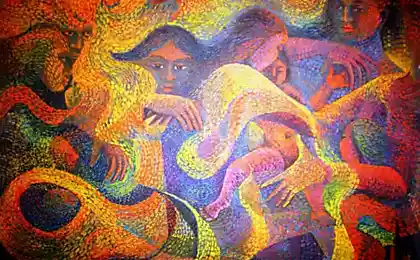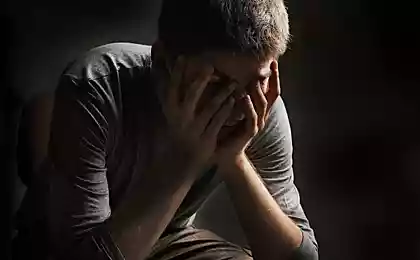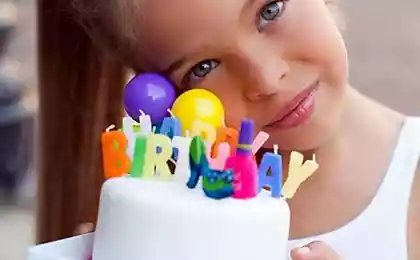516
Children's grief
The most profound grief we experience with the loss of loved ones, loved ones, important people. In this example I want to analyze the situation of grieving children, although to him (grief) may be other, somewhat less dramatic reasons.
There are two main types of emotional reactions and behaviors accompanying the experience of grief in children (mainly pre-school children, but may apply to younger students) – it is conditionally possible to tell a grieving adult and child type.
There are children who show us the reactions to grief are very similar to ours, older reactions: crying, depression, anger, mood swings, depression, denial — the five stages of grief in the correct order, or without it. This is the reaction of the adult type. And there are children who demonstrate a zero response – as if do not know the trouble and do not understand what happened, or minimal spontaneous reaction that adults in the child's environment difficult to reconcile with what had happened in the family misfortune, especially in the absence of the expected reactions to a major loss. These are all experiences on child type.
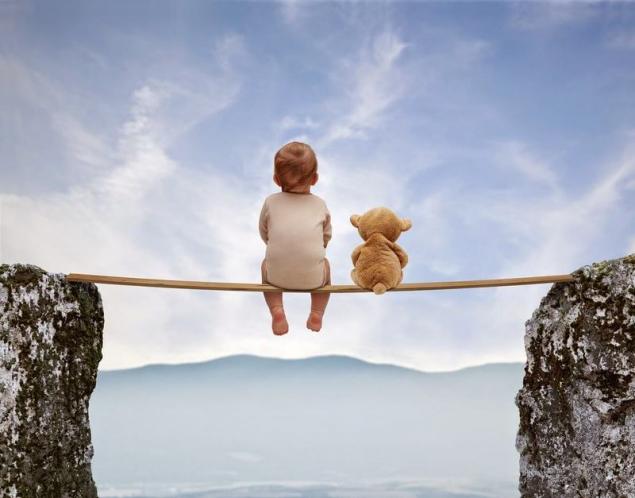
If a child is experiencing acute emotions are "child like" adults tend to perceive it with great relief in the family loss, grief and, of course, adults are afraid of how it will affect the baby, but thank God he is too young to understand.
This kid can sing a cheerful song in the hearse, playing the "flower beds" adjacent graves in the cemetery, right after returning from the hospital where he died close, ask for the cartoons and as if nothing had happened to enjoy them; ignoring information about permanently leaving a loved to speak of him as present in your life or, conversely, very rapidly and completely forget about his existence, crossing out of their conversations, games, plans. Usually the adults support the child in this and is relieved that beloved child, because of his child's perception does not have to go through the same suffering that they are going through, adults.
And this is a very dangerous situation. You probably understand why? When a child is experiencing grief in adult type – for adults clear and you can see his condition, they can support the child and help, consciously or not, correctly or with errors, but to help him through all that grief, at least the most acute phases.
When a child is experiencing grief for the child type, it is completely deprived of the help of adults, he and his first, the most acute phase of grief is in isolation and because of their own, closed-off way of experiencing and because of ignoring these experiences from the adult.
In most cases this leads to capsulate experience – they are closed in a kind of "time capsule"such as were without the ability to change, to process, to be experienced and integrated into the experience. And with these experiences, the child who survived the loss of lives over the years, even as an adult. Sometimes the whole life, if somehow this capsule will not open. Well, if the process of psychotherapy or purposeful work in a suitable and favorable situations. But most of these "capsules" are opened randomly at the moment is quite inappropriate – in a crisis, nikkoresources of a situation where a person would need all of its features.
To be the bearer of this is not experienced, not just endured — not even expressed grief means to have a locked part of himself inside of which is a sharp pain the first day "my mom died", "I lost a brother,"...
Always, every day, that blocked part of the lives in that first day. It is an enormous outflow of energy and strength! Just imagine what is load — every day a part of your soul hurts like the first day. Even if consciously this pain does not feel, does not identificeret, this is a huge burden. Like trauma the body when you give anesthesia, but despite the fact that we do not feel pain at the level of consciousness, our body spends a lot of effort, to the care of the sick area of the body. And we only feel the consequences of this outflow of resources, without feeling the cause.
Adults with "decapsulating" not experienced by trauma usually describe their condition as not being able to be filled, a hole or a sieve through which energy is constantly flowing, the need to constantly pump up strength and the ability to keep them. Therapy such cases is quite successful and, without aggravating circumstances, quick. But the catch is that the bearers of the "time capsule" on a conscious level do not know about its existence – on the shell of the capsule is not written "in my childhood, I lost a close, but easily survived it".
This is grown from the then environment child wrote their stories about the events of those days. Many times repeated the story about our childhood, sometimes indistinguishable from, their own memories, especially if really got no memories – they takamalirawo away from conscious memory. In such a situation, it turns out that people just don't see the connection between some distant fact of his biography and the current state of inner energy balance. Therefore, cannot tackle the problems or to seek help.
But back to the children. Adults in the child's environment is necessary to understand – as if the child did not react, what would he do, how would outwardly act like that if he was able to complete the formation of the attachment*, it feels the same deep and powerful grief experienced by anyone who has lost a loved. Even if his behavior you do not inform directly.
* Different studies differ in defining the age at which a child is able to take of affection, from a few months to three years. I am of the view that humanistic, moral and ethical affection and love in the familiar shape becomes possible only with awareness and recognition of own I and the people around them.
This happens in about the age of three. Until then, however, there is affection of another kind, which precedes this and is the basis for its formation – communication with main adults and other important people, the bond that formed almost from birth and is extremely important, paramount. Therefore, the experiences of the toddler I would suggest to take no less seriously, especially if he already has a wide range of emotions and ways to Express them.
If to speak about concrete recommendations (which I certainly hope none of us will come in handy), let us structure. First of all, let me talk about similarities, regardless of what type is the reaction of those moments that seem to me important and not always are reflected in other similar lists of recommendations. But in more details this theme is revealed repeatedly in the materials on this subject that you can find in abundance.
Adults around the child who have experienced loss, should:
— As early as possible to begin to pay individual attention to the child. If you are in the nearest environment of people, but I see that next is unable to care for a child right now, help in this situation. Or adults acquire forces in contact with your child, or help directly with dealing with a familiar baby. The child is very important as early as possible to be in the field of targeted attention and care.
- A very harmful influence of modern culture on the child having the archaic (early and effective) deliberate "feeling sorry for the orphan", the lamentations, overly sympathetic look in his eyes, "Malyshkova" attitude. Avoid this and stop others
- It is important for the child and to follow him half a step behind. Figuratively speaking. Especially in the period following the first acute stage times. This is a subtle point – not to convince the child unnecessary worries, not asking his true feelings to his interpretation of how and what he should feel, but not leaving him in isolation with their feelings.
And of course one of the most important things is honesty. At all stages, starting from the first message the child bad news, adults need to be as forthcoming as possible, so far as they are capable adults. Unambiguous lie (about hospitals, travel, motels, spy work, etc.). should not be at all. The rest – the more sincerity you can afford, the better for the child.
— It is important to make the right transition to normal life after the news of the death of active and emergency activities in the early days. The right transition in this case, the smooth return to normal life. Usually in household matters life returns to normal in the first days after the funeral.
For a child it can be stressful to see that life goes on as well as was without father\mother\brother\grandfather. If for adults this is sometimes a medication for a child opposite – re-pain. Beloved disappeared and the world around did not notice! Therefore, the transition should be smooth. If in everyday terms things are going well and the family is not experiencing itself household changes, we should pay specially attention to ensuring that the transition to normal life occupied gradually and gradually for several weeks.
- Allow the child to talk about their experiences – the person close to the deceased, and mention of it should not be tabuirovannykh in the family. If a child talks about a painful topic or otherwise shows his experience, never interrupt him, do not switch his attention. This is good in the case of bruised knees or fallen in a puddle of ice cream and totally unacceptable in case of loss of a loved one. Do not interrupt the conversation when the child enters the room, I could slip and round off the topic, but not ascites in mid-sentence as if he caught you doing anything wrong or its appearance has violated your space.
- Strictly to not to shift the emotional role of the deceased child ("Now you are the one I have left," "I now live only for you", etc.) the Adult must be very careful to monitor themselves because this shifting often occurs not in the words which catch not difficult, and actually emotionally. Here to notice and to contain much more complicated.
- Adaptation to loss and translation of thrilling experiences a child may take up to six months or more. Depending on how strong was the departed loved one. Therefore, adults need to maintain vigilance for long periods of time and to correlate changes in the behavior of the child with a possible extension of the response to the loss. For example, sleep can be broken a few months later, when consciously during waking the child, it would seem, is in the final stages or even suffered a loss. This is a typical example.
If we are talking about a child reacting "child like" adults separately, plus to the foregoing, we:
— Treat the baby as carefully and gently as to a child who shows sad emotions. Sometimes you have to make a conscious effort.
— To pause the training and new, are not learned as a child, disciplinary moments, but not much to slow down the activity in the usual child leisure. It is extremely important not to increase the intensity – not to appease the child amenities and entertainment. Balance in all important balance.
- Keep track of possible stages of passage child of griefabout them, which says a lot, we will not dwell on this.
— To initiate conversations about the deceased from his face, sharing his impressions and experiences (it is very important share as a senior with Junior, telling his example about what can be feelings and that these feelings are normal, and not as equals in search of support), ask the child open-ended questions.
It is open, it is difficult, but important. Open-ended question, "what do you feel?" suggestive "are you sad?". If you want to give an example, so that the child understood, the question should sound more comprehensive listing of open-ended: "What do you feel? People are angry, or sad, or tired, or it is not clear what having fun and can even get scared, or feel guilty, or they are bored, or something else, anything."
It is very important not to be afraid to grieve in front of the child or something to discuss with him, involve him in a ritual or a memorable event. Adults often avoid it – he did not understand, well, let's not upset him. But as we have outlined above – he understood and already upset, simply outwardly reacting in atypical adult eyes. This tactic of silencing the experiences of the child, which is largely internally distanced from them, close even more.
But really, the best option in the situation with the child's experiences in child type (I don't often say so explicitly, but there is no other way), the best option is as soon as possible to consult a specialist. Not the baby, of course, and by adults, to help them help their child. Helped to define the boundaries of where help is needed, as are stages of emotions, how to speak with this child and it is at this stage etc. Because it's such a complex topic, and adults at this moment are usually also experiencing the same grief that only complicates for them the task of helping the child.
And finally, we want to note that children have different depths attachment to different family members and with those with whom the child is living together it is much deeper than living separately from his family. Children have a territorial attachment is much stronger than adults. And the second point – children usually feel ordinary life, i.e. to the care of old grandparents, even during hot attachment, the child probably will react properly and quickly go to the last stage, the stage of adoption, usually completely bypassing the phase of guilt.
Conversely, the loss of a young loved one likely child a great deal of time stuck in denial, anger or guilt. Therefore, assessing the child's condition after the loss, determining whether it is in a situation response on child type or not, consider this factor. For example, losing a favourite old great-grandmother, a child, a week may be at the stage of adoption, with light sadness, good memories, sometimes sad experiences of this lack in my life. And it won't experience on child type.
That's probably all. And now – all good health, good brakes-for cars, safe entrances, slippery floors in the bathroom, harmless products and other benefits. Do not get sick and live a long, long time you and your family! published
P. S. And remember, only by changing their consumption — together we change the world! ©
Join us in Facebook , Vkontakte, Odnoklassniki
Source: tehhi-karamir.livejournal.com/308721.html
There are two main types of emotional reactions and behaviors accompanying the experience of grief in children (mainly pre-school children, but may apply to younger students) – it is conditionally possible to tell a grieving adult and child type.
There are children who show us the reactions to grief are very similar to ours, older reactions: crying, depression, anger, mood swings, depression, denial — the five stages of grief in the correct order, or without it. This is the reaction of the adult type. And there are children who demonstrate a zero response – as if do not know the trouble and do not understand what happened, or minimal spontaneous reaction that adults in the child's environment difficult to reconcile with what had happened in the family misfortune, especially in the absence of the expected reactions to a major loss. These are all experiences on child type.

If a child is experiencing acute emotions are "child like" adults tend to perceive it with great relief in the family loss, grief and, of course, adults are afraid of how it will affect the baby, but thank God he is too young to understand.
This kid can sing a cheerful song in the hearse, playing the "flower beds" adjacent graves in the cemetery, right after returning from the hospital where he died close, ask for the cartoons and as if nothing had happened to enjoy them; ignoring information about permanently leaving a loved to speak of him as present in your life or, conversely, very rapidly and completely forget about his existence, crossing out of their conversations, games, plans. Usually the adults support the child in this and is relieved that beloved child, because of his child's perception does not have to go through the same suffering that they are going through, adults.
And this is a very dangerous situation. You probably understand why? When a child is experiencing grief in adult type – for adults clear and you can see his condition, they can support the child and help, consciously or not, correctly or with errors, but to help him through all that grief, at least the most acute phases.
When a child is experiencing grief for the child type, it is completely deprived of the help of adults, he and his first, the most acute phase of grief is in isolation and because of their own, closed-off way of experiencing and because of ignoring these experiences from the adult.
In most cases this leads to capsulate experience – they are closed in a kind of "time capsule"such as were without the ability to change, to process, to be experienced and integrated into the experience. And with these experiences, the child who survived the loss of lives over the years, even as an adult. Sometimes the whole life, if somehow this capsule will not open. Well, if the process of psychotherapy or purposeful work in a suitable and favorable situations. But most of these "capsules" are opened randomly at the moment is quite inappropriate – in a crisis, nikkoresources of a situation where a person would need all of its features.
To be the bearer of this is not experienced, not just endured — not even expressed grief means to have a locked part of himself inside of which is a sharp pain the first day "my mom died", "I lost a brother,"...
Always, every day, that blocked part of the lives in that first day. It is an enormous outflow of energy and strength! Just imagine what is load — every day a part of your soul hurts like the first day. Even if consciously this pain does not feel, does not identificeret, this is a huge burden. Like trauma the body when you give anesthesia, but despite the fact that we do not feel pain at the level of consciousness, our body spends a lot of effort, to the care of the sick area of the body. And we only feel the consequences of this outflow of resources, without feeling the cause.
Adults with "decapsulating" not experienced by trauma usually describe their condition as not being able to be filled, a hole or a sieve through which energy is constantly flowing, the need to constantly pump up strength and the ability to keep them. Therapy such cases is quite successful and, without aggravating circumstances, quick. But the catch is that the bearers of the "time capsule" on a conscious level do not know about its existence – on the shell of the capsule is not written "in my childhood, I lost a close, but easily survived it".
This is grown from the then environment child wrote their stories about the events of those days. Many times repeated the story about our childhood, sometimes indistinguishable from, their own memories, especially if really got no memories – they takamalirawo away from conscious memory. In such a situation, it turns out that people just don't see the connection between some distant fact of his biography and the current state of inner energy balance. Therefore, cannot tackle the problems or to seek help.
But back to the children. Adults in the child's environment is necessary to understand – as if the child did not react, what would he do, how would outwardly act like that if he was able to complete the formation of the attachment*, it feels the same deep and powerful grief experienced by anyone who has lost a loved. Even if his behavior you do not inform directly.
* Different studies differ in defining the age at which a child is able to take of affection, from a few months to three years. I am of the view that humanistic, moral and ethical affection and love in the familiar shape becomes possible only with awareness and recognition of own I and the people around them.
This happens in about the age of three. Until then, however, there is affection of another kind, which precedes this and is the basis for its formation – communication with main adults and other important people, the bond that formed almost from birth and is extremely important, paramount. Therefore, the experiences of the toddler I would suggest to take no less seriously, especially if he already has a wide range of emotions and ways to Express them.
If to speak about concrete recommendations (which I certainly hope none of us will come in handy), let us structure. First of all, let me talk about similarities, regardless of what type is the reaction of those moments that seem to me important and not always are reflected in other similar lists of recommendations. But in more details this theme is revealed repeatedly in the materials on this subject that you can find in abundance.
Adults around the child who have experienced loss, should:
— As early as possible to begin to pay individual attention to the child. If you are in the nearest environment of people, but I see that next is unable to care for a child right now, help in this situation. Or adults acquire forces in contact with your child, or help directly with dealing with a familiar baby. The child is very important as early as possible to be in the field of targeted attention and care.
- A very harmful influence of modern culture on the child having the archaic (early and effective) deliberate "feeling sorry for the orphan", the lamentations, overly sympathetic look in his eyes, "Malyshkova" attitude. Avoid this and stop others
- It is important for the child and to follow him half a step behind. Figuratively speaking. Especially in the period following the first acute stage times. This is a subtle point – not to convince the child unnecessary worries, not asking his true feelings to his interpretation of how and what he should feel, but not leaving him in isolation with their feelings.
And of course one of the most important things is honesty. At all stages, starting from the first message the child bad news, adults need to be as forthcoming as possible, so far as they are capable adults. Unambiguous lie (about hospitals, travel, motels, spy work, etc.). should not be at all. The rest – the more sincerity you can afford, the better for the child.
— It is important to make the right transition to normal life after the news of the death of active and emergency activities in the early days. The right transition in this case, the smooth return to normal life. Usually in household matters life returns to normal in the first days after the funeral.
For a child it can be stressful to see that life goes on as well as was without father\mother\brother\grandfather. If for adults this is sometimes a medication for a child opposite – re-pain. Beloved disappeared and the world around did not notice! Therefore, the transition should be smooth. If in everyday terms things are going well and the family is not experiencing itself household changes, we should pay specially attention to ensuring that the transition to normal life occupied gradually and gradually for several weeks.
- Allow the child to talk about their experiences – the person close to the deceased, and mention of it should not be tabuirovannykh in the family. If a child talks about a painful topic or otherwise shows his experience, never interrupt him, do not switch his attention. This is good in the case of bruised knees or fallen in a puddle of ice cream and totally unacceptable in case of loss of a loved one. Do not interrupt the conversation when the child enters the room, I could slip and round off the topic, but not ascites in mid-sentence as if he caught you doing anything wrong or its appearance has violated your space.
- Strictly to not to shift the emotional role of the deceased child ("Now you are the one I have left," "I now live only for you", etc.) the Adult must be very careful to monitor themselves because this shifting often occurs not in the words which catch not difficult, and actually emotionally. Here to notice and to contain much more complicated.
- Adaptation to loss and translation of thrilling experiences a child may take up to six months or more. Depending on how strong was the departed loved one. Therefore, adults need to maintain vigilance for long periods of time and to correlate changes in the behavior of the child with a possible extension of the response to the loss. For example, sleep can be broken a few months later, when consciously during waking the child, it would seem, is in the final stages or even suffered a loss. This is a typical example.
If we are talking about a child reacting "child like" adults separately, plus to the foregoing, we:
— Treat the baby as carefully and gently as to a child who shows sad emotions. Sometimes you have to make a conscious effort.
— To pause the training and new, are not learned as a child, disciplinary moments, but not much to slow down the activity in the usual child leisure. It is extremely important not to increase the intensity – not to appease the child amenities and entertainment. Balance in all important balance.
- Keep track of possible stages of passage child of griefabout them, which says a lot, we will not dwell on this.
— To initiate conversations about the deceased from his face, sharing his impressions and experiences (it is very important share as a senior with Junior, telling his example about what can be feelings and that these feelings are normal, and not as equals in search of support), ask the child open-ended questions.
It is open, it is difficult, but important. Open-ended question, "what do you feel?" suggestive "are you sad?". If you want to give an example, so that the child understood, the question should sound more comprehensive listing of open-ended: "What do you feel? People are angry, or sad, or tired, or it is not clear what having fun and can even get scared, or feel guilty, or they are bored, or something else, anything."
It is very important not to be afraid to grieve in front of the child or something to discuss with him, involve him in a ritual or a memorable event. Adults often avoid it – he did not understand, well, let's not upset him. But as we have outlined above – he understood and already upset, simply outwardly reacting in atypical adult eyes. This tactic of silencing the experiences of the child, which is largely internally distanced from them, close even more.
But really, the best option in the situation with the child's experiences in child type (I don't often say so explicitly, but there is no other way), the best option is as soon as possible to consult a specialist. Not the baby, of course, and by adults, to help them help their child. Helped to define the boundaries of where help is needed, as are stages of emotions, how to speak with this child and it is at this stage etc. Because it's such a complex topic, and adults at this moment are usually also experiencing the same grief that only complicates for them the task of helping the child.
And finally, we want to note that children have different depths attachment to different family members and with those with whom the child is living together it is much deeper than living separately from his family. Children have a territorial attachment is much stronger than adults. And the second point – children usually feel ordinary life, i.e. to the care of old grandparents, even during hot attachment, the child probably will react properly and quickly go to the last stage, the stage of adoption, usually completely bypassing the phase of guilt.
Conversely, the loss of a young loved one likely child a great deal of time stuck in denial, anger or guilt. Therefore, assessing the child's condition after the loss, determining whether it is in a situation response on child type or not, consider this factor. For example, losing a favourite old great-grandmother, a child, a week may be at the stage of adoption, with light sadness, good memories, sometimes sad experiences of this lack in my life. And it won't experience on child type.
That's probably all. And now – all good health, good brakes-for cars, safe entrances, slippery floors in the bathroom, harmless products and other benefits. Do not get sick and live a long, long time you and your family! published
P. S. And remember, only by changing their consumption — together we change the world! ©
Join us in Facebook , Vkontakte, Odnoklassniki
Source: tehhi-karamir.livejournal.com/308721.html
SUPERPACK from bubafonja oven long burning their hands
The health of Your skin — NATURAL bio cosmetics
